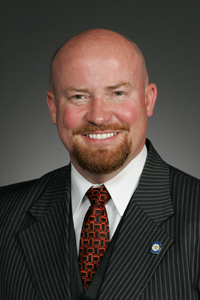
Three Reasons Oklahoma’s Income Tax Cut Plan Failed
-
Joe Wertz
After months of debate, discussion and rancor from lawmakers, business leaders and think-tank activists, the state legislative session will close today without an income tax cut.
Cutting the personal income tax was a top priority for Gov. Mary Fallin and Republican legislators.
More than a half-dozen income tax-cutting measures were filed. Some contained immediate reductions; others were tagged with triggers and multi-year phase-outs.
Here’s what went wrong:
1. Tenacious Tax Credits
Remember the Tax Credit Task Force?
Last year, Gov. Fallin empowered 10 lawmakers to study the effectiveness of state tax credits and economic incentives. The group — led by state Rep. David Dank, R-Oklahoma City, and Sen. Mike Mazzei, R-Tulsa — met 10 times and, among other reforms, recommended reining in dozens of credits through suspension, sun-setting and extended moratoriums.

Joe Wertz / NPR StateImpact
Rep. David Dank, R-Oklahoma City, at the final meeting of the tax credit task force.
The task force also recommended eliminating transferable tax credits, which are often sold to other companies and individuals for 80 cents on the dollar. Eliminating transferable tax credits alone could have saved the state $30 million a year, officials said.
The personal income tax is the state’s largest source of tax revenue, and several measures to reduce the tax depended on cutting tax credits to offset lost revenue.
Lobbying was fierce.
The income tax-cutting plans were doomed largely when lawmakers failed this year to cut corporate tax credits, reports The Oklahoman’s Michael McNutt.
2. Increased Tax Burdens for Many
As the end of the legislative session loomed, one plan prevailed. A week before the session’s end, Fallin and Republican leaders announced a plan that would cut the top personal income tax rate to 4.8 percent from 5.25 percent.
The plan included an additional rate reduction tied to a 5-percent growth trigger in FY 2015.
This plan also called for eliminating 33 tax credits, but no major incentives were targeted. Some deductions would have been eliminated, as would the personal exemption for single filers making more than $35,000 a year and joint filers who earn more than $70,000.
Estimates showed that most Oklahomans would see their income taxes reduced under the measure, Fallin said. But the plan would have increased the tax burden for 24 percent of state taxpayers, according to an Oklahoma Tax Commission estimate, and would have had especially “adverse” effects on middle-class Oklahomans with two or more children, The Oklahoman reported.
Details emerged Monday that married couples with four children who itemize with a federal adjusted gross income of $70,000 to $80,000 would see a tax increase of about $200, according to estimates prepared by the Oklahoma Tax Commission. Married couples with two children who itemize with an income of $70,000 to $80,000 would see a tax increase of about $100.
At least 40 percent of those with a federal adjusted gross income between $8,000 and $25,999 would have an increased tax burden next year under the proposed plan. Estimates show 400,000 of the state’s 1.6 million personal income tax filers would see a tax increase.

Oklahoma House of Representatives
Rep. Joe Dorman, D-Rush Springs, said the income tax cut proposal was unconstitutional under SQ 640.
3. Constitutionality Questions
Oklahoma voters approved State Question 640 in 1992. The measure requires tax increases receive three-fourths support in the House and Senate, or go to a vote of the people.
The question: Could cutting the income tax cut be interpreted as a tax increase?
Yes, according to state Rep. Joe Dorman, D-Rush Springs.
House Speaker Kris Steele, R-Shawnee, disagreed:
“This represents a net tax decrease,” Steele told the Tulsa World‘s Barbara Hoberock. While some may not get as much back in their refunds, they will not be paying more, the speaker said.
Fallin is pledging to fight again next year:
“I am going to keep pushing for the tax cut, but we have a clean slate now,” the Governor told the World.

